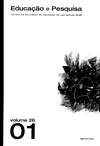Oral language at school in an age of networks
DOI:
https://doi.org/10.1590/S1517-97022000000100004Keywords:
Orality, Genres, Popular culture, CurriculumAbstract
This paper offers reflections about the possibilities of teaching the oral language. It starts from the conceptions put forward by the National Curriculum Guidelines (Brazil) for the primary school as well as from consensual criticisms that have disclosed the lack of pedagogical material and of curricula that can provide the spoken language and the oral productions with a didactic-pedagogical treatment adequate to the role they play both in the practical use of language and in the literary field. The reflections are developed from the concept that the language is an instrument, a medium for interaction and for the constitution of subjectivities; they adopt Bakthins concept of discourse genre and construct their contextual coherence based on the pedagogical praxis of the author in teachers education (preservice and in-service). It argues for a curriculum perspective that considers orality, within the present context of new technologies, as a complex, dynamic field, sufficiently apt to interactions with the written language, particularly with the literature. A draft of a model is suggested that proposes a didactic-pedagogical treatment of the activities of listening and oral production in clear conjunction with reading and written production activities. The model also introduces reflections about the possibilities and advantages of including, without prejudices, contemporary oral productions and those originated from the oral tradition.Downloads
Download data is not yet available.
Downloads
Published
2000-01-01
Issue
Section
Articles
License
Authors assume exclusive responsibility for the concepts expressed in their articles, which do not necessarily reflect the journal’s opinion.
Permission to photocopy all or part of the material published in the journal is granted provided that the original source of publication be assigned.
How to Cite
Oral language at school in an age of networks . (2000). Educação E Pesquisa, 26(1), 53-65. https://doi.org/10.1590/S1517-97022000000100004



